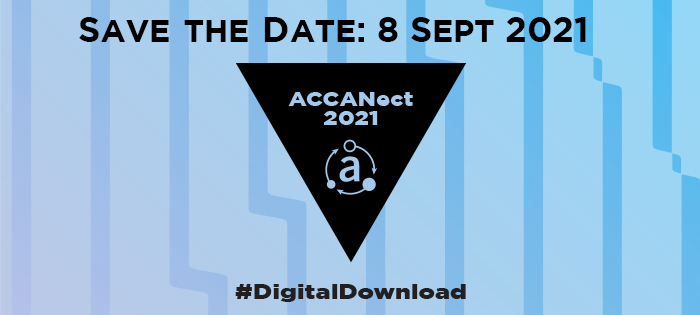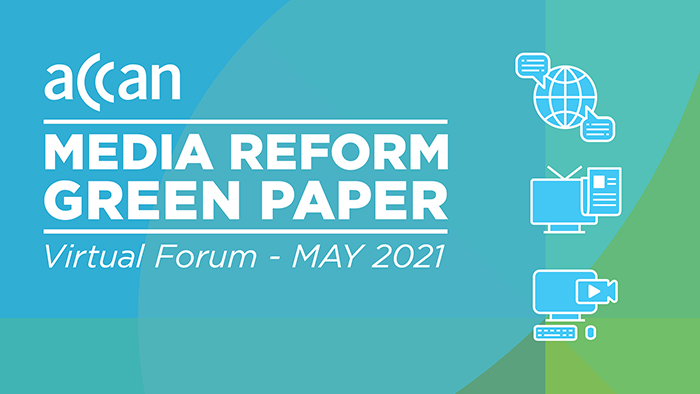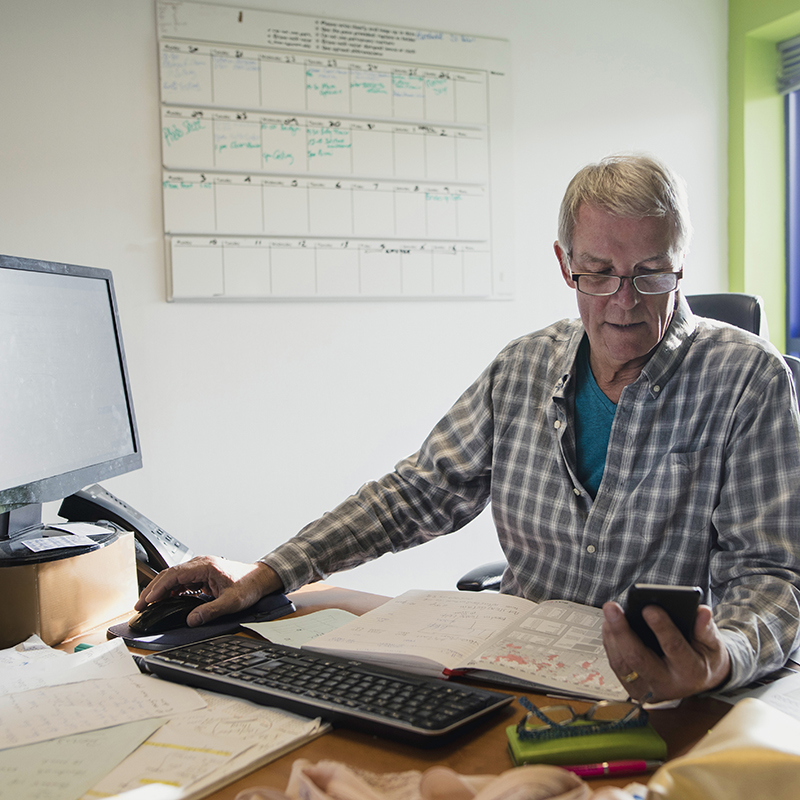ACCAN is seeking nominations for Directors to fill three (3) vacancies on its Board.
In accordance with the ACCAN Constitution, the 2021-2022 ACCAN Board will consist of nine (9) members1. Six (6) positions are continuing Directors from the 2020-2021 Board. Three (3) Directors are retiring from the Board but may be eligible for re-election as stated in the ACCAN Constitution.
In accordance with the ACCAN Constitution Board members are elected for a three year term.
In order to ensure an appropriate balance, the Board is particularly seeking candidates with legal and regulatory expertise; and/or experience in financial management and governance in a not for profit organisation; and/or from an Indigenous background or with strong linkages to Indigenous communities.
Read more: Call for nominations for the ACCAN Board
Write comment (0 Comments)
With parts of the nation remaining in lockdown due to the spread of COVID-19, many people have turned to streaming services to keep entertained with a new TV series or movie, or tuned in to see Australia compete for gold in the Olympics. With more time spent streaming, the ever-so-painful experiences of long buffering times, low resolution displays, or unexpectedly high data usage are becoming more and more common. The good news is that there are several steps that consumers can take when using streaming services to ensure the best possible experience.
Read more: Troubleshooting streaming issues
Write comment (0 Comments)
Exploring the handling of complaints against digital platforms, examining the performance of telco customer service chatbots, and assessing the surveillance risks of Family Plans for victims of domestic and family violence will be the focus of some of the important projects receiving funding through the Australian Communications Consumer Action Network (ACCAN)’s 2021 Grants program.
The ACCAN Grants Program funds projects which undertake research on telecommunications issues, represent consumers or create educational tools which empower consumers to derive the greatest benefit from telecommunications products and services.
Read more: ACCAN 2021 Grant Program Projects Announced
Write comment (0 Comments)
ACCAN wants to hear about your experience with your ADSL internet service.
ADSL stands for ‘asymmetric digital subscriber line’. ADSL is a broadband internet connection delivered through the same copper wiring that your home phone may use. The ACCC are soon to begin an inquiry into whether Telstra should continue to provide access to wholesale ADSL services on request. The outcome of the ACCC inquiry could impact price and retail choice of ADSL services for regional, rural and remote consumers.
Read more: Do you use an ADSL broadband connection?
Write comment (3 Comments)ACCAN has announced the date for its 2021 National Conference. ACCANect 2021 #DigitalDownload will be held Online, 8th September 2021. Mark your diaries now for Australia's premiere telecommunications conference.

Network and meet new people
We expect over 200 attendees including industry leaders, international delegates, consumer groups, government and regulators as well as mainstream media. The ACCANect 2021 digital event platform offers all delegates live access to Speakers sessions as well as interactive networking opportunities with other delegates, speakers, exhibitors and sponsors.
Read more: Save the Date: ACCANect 2021 #DigitalDownload
Write comment (0 Comments) Over the last ten years, faster internet speeds have dramatically impacted the way that Australians consume media. Many Australians have switched from free-to-air television (FTA) to subscription video on demand services. These include streaming services like Netflix, Stan, and Kayo and broadcast video on demand (FTA catch-up services, or BVOD). According to the ACMA, 77% of Australian households now have at least one SVOD service, compared to 61% in 20171.
Over the last ten years, faster internet speeds have dramatically impacted the way that Australians consume media. Many Australians have switched from free-to-air television (FTA) to subscription video on demand services. These include streaming services like Netflix, Stan, and Kayo and broadcast video on demand (FTA catch-up services, or BVOD). According to the ACMA, 77% of Australian households now have at least one SVOD service, compared to 61% in 20171.
With viewers switching from free-to-air to online content, there have been many questions raised about how the traditional media industry can sustain itself in a world where advertising dollars follow audiences; with less people tuning in to traditional media, these outlets are less attractive to advertisers. Regional newspapers and television channels are also closing because of loss of advertising revenue. To help keep Australia’s media sector alive, the Government needs to find a way to modernise television regulation.
With the expansion in dependency on data services and roll-out of 5G Mobile, the government is also looking at how they manage the limited spectrum used for telecommunications and broadcasting.
To encourage input and debate from interested parties about how the media laws should be changed, the Government released a Green Paper in November 2020 with proposals for new ways to fund Australian media and how it operates.
Read more: Media Reform Green Paper – Modernising Television Regulation in Australia
Write comment (0 Comments)What media reforms are proposed in the Green Paper?
Spectrum reform
The key reform proposal relates to technical changes in the way broadcasting content might be delivered. Australian broadcast television is delivered using ‘spectrum’, and there is only a finite amount of spectrum available. Currently, all of the available spectrum is being used for free-to-air television broadcasting.
However, new digital broadcasting technology means less spectrum can now be used to deliver the same broadcasting services. The Government would like television broadcasters to work together to use less spectrum because:
- If enough broadcasters agree to broadcast on less spectrum, there will be more free spectrum available to be used for other purposes. One of these potential purposes is to reallocate that spectrum to improve telecommunications networks in currently underserviced areas.
- Because the amount of spectrum available is finite, it is a valuable asset. The Government could auction off this spectrum for a profit, which it says could then be re-invested. A fund could be established to support more regional news and more Australian drama, documentary and children’s content.
- For example, the profit could be invested in more local news services in regional, rural and remote areas of Australia, and/or local television and film content production. The Green Paper doesn’t specify how much of the profit would be invested in local and regional news, or Australian content production.
Read more: Background to the Media Reform Green Paper
Write comment (0 Comments)Good afternoon,
Before I begin, I want to acknowledge that I am on the land of the Gadigal people of the Eora nation, and pay my respects to their Elders past, present and emerging..
This afternoon, there are three areas that I’d like to discuss:
- The need for reliable and fair communications
- Consumer issues with Digital Platforms and IOT
- Media Reform Green Paper
Read more: 2021 CommsDay Summit Speech by ACCAN CEO Teresa Corbin
Write comment (0 Comments)With much of Australia’s east coast currently impacted by wild weather, many Australians have found themselves evacuated or having lost telecommunications services due to the impact of this strong weather.
Which mobile phone and nbn sites have been impacted?
Optus
Visit Optus’ website to get the latest updates for customers in flood-impacted areas
Telstra
Visit Telstra’s website to get the latest updates for customers in flood-impacted areas
Read more: NSW and SE QLD Telco Floods Support Updates
Write comment (0 Comments)Consumers often experience long wait times and poor customer service when trying to resolve issues with their telcos, but how much time does this take, and at what cost?
To find out, ACCAN commissioned a survey to ask 2994 consumers about their experiences when they contact their telco. Based on the results, we have worked out the cost to consumers in time lost resolving their telco issue, instead of doing something else.
Read more: Still Waiting … the cost of customer service
Write comment (0 Comments)The No Australian Left Offline - National Webinar was held 9 December and provided a report back on the key issues from the 6 State and Territory based virtual roundtables that have taken place during 2020.
These roundtables have provided a unique opportunity for those involved to share and discuss some of the barriers that are impacting communities when it comes to getting connected and using the internet.
ACCAN and nbn Co. plan to continue this collaborative approach into 2021, working towards more affordable, reliable broadband services for all Australians.
Read more: No Australian Left Offline - National Webinar
Write comment (0 Comments)ACCAN’s Survey reveals telecommunications services are essential to small businesses but they are being let down by performance and customer service.

ACCAN surveyed 183 small and medium sized businesses between September – October to gain an understanding of SME’s experiences with their telecommunications providers during the pandemic.
Issues of speed, reliability, poor customer service and high costs were predominant. Of all the issues, speed and reliability was mentioned the most, with 39% of SMEs who provided feedback citing poor service performance, slow internet speeds, dropouts, outages, congestion and unacceptable latency.
Read more: Telco service essential to small business
Write comment (0 Comments)